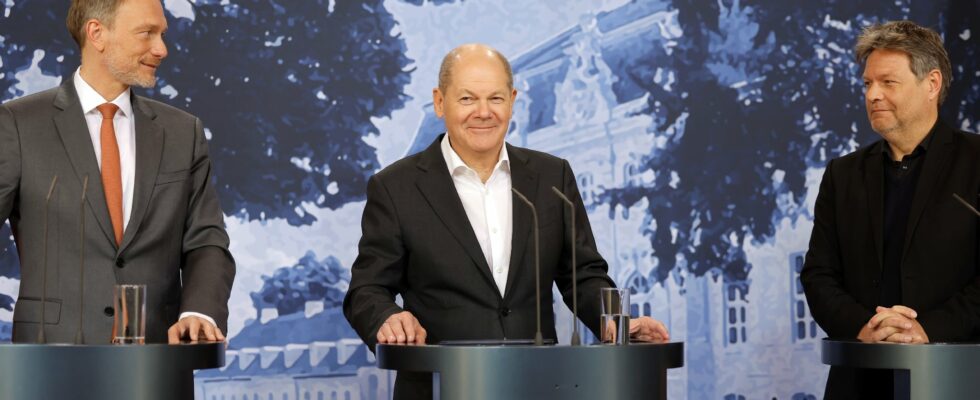The second largest financial supporter of kyiv after the United States – outside the European Union – Germany has decided to gradually reduce its budget dedicated to military aid to Ukraine. Currently at 8 billion euros for the year 2024, the financial windfall will be halved (i.e. 4 billion euros) for next year. The planning is intended to be regressive since only 3 billion euros should be released in 2026, then half a billion euros annually from 2027. The result of an agreement reached within the government coalition led by Chancellor Olaf Scholz – including the SPD (Social Democrats), Die Grünen (The Greens in French) and the FPD (Liberals) – the decision, motivated by a desire for budgetary savings, divides economists, as reported in an article in the German daily Frankfurter Allgemeine Zeitung (FAZ).
“I am somewhat astounded by the fact that there is apparently a desire to save the peace of the coalition at the expense of Ukraine and European security,” Moritz Schularick, president of the Kiel Institute for the World Economy, a German economic research institute, told FAZ. The general daily newspaper claims that the reduction of German aid would lead to “consequential costs much higher than the means currently saved,” emphasizing in particular a significant influx of refugees in the event of a “defeat of Ukraine” and a prolongation of the conflict.
But Jens Südekum – an economist from Düsseldorf and member of the scientific council of the SPD economic forum – does not see this budget cut as “a breach of the promise given to Ukraine”. For him, the mobilisation of frozen Russian assets – on which the German government is banking – ensures that Ukraine “will not have less money available next year, but more than this year”. Last May, the member states agreed to make use of the 200 billion euros of Russian assets concentrated in the Euroclear clearing house. This is a private infrastructure that contributes to the smooth functioning of the financial markets. It is located in Belgium.
Aid to Ukraine as an adjustment variable
Thanks to this decision, “European leaders estimate that they will be able to free up 2.5 to 3 billion euros per year” for Ukraine, according to the news site. Public lifewhich depends on the French administration. Last February, the European Union also raised a credit of 50 billion euros, intended for Ukraine, for the period 2024-2027. “But we don’t know when this money will be available,” warns Moritz Schularick. For his part, Jens Südekum recognizes that it is legitimate to say that kyiv needs much more financial support. “But [débloquer de nouveaux fonds] “was not possible with the FDP,” he said, blaming one of the three pillars of the coalition.
Indeed, the consequences of this reduction are above all the result of the difficulty of finding a common political direction among the members of the government coalition. “It is difficult for Scholz to bring together people who have a very different, or even completely opposed, conception of the State,” we wrote in our columns, on the occasion of an exclusive dossier of The Expressdedicated to our Germanic neighbors. The latter highlights the economic difficulties encountered by the coalition, whose record is “the worst since the Schröder years”. Germany in particular experienced recession in 2023, seeing its GDP contract by 0.3% compared to 2022.
The SPD is taking advantage of the difficult economic climate and the ideological divergence with the FDP liberals to attribute the initiative for this unpopular budget cut to the latter. A responsibility that would be due to the FDP’s desire to respect the policy of the Brake lever – “debt brake” in French -, one of the founding principles of German economic policy. But Clemens Fuest assures that this attack is “misleading”. Still in the columns of the FAZ, the president of the Ifo – a Bavarian economic research institute – affirms that the argument calling into question the Brake lever hides what the coalition could have done differently to keep aid to Ukraine flowing.
Despite the budget cuts in support for Ukraine, the coalition will present a financing plan that is still 12 billion euros short. An amount that governments are still struggling to reach in single digits. In the meantime, the media consequences of the funding cut are being felt. “No new orders are being placed for Ukraine because they are no longer being funded,” MP Andreas Schwarz told the weekly Frankfurter Allgemeine SonntagszeitungOn August 19, faced with the media coverage of the announcement, the government spokesman – Wolfgang Büchner – had to assure, during a press conference, that “support for Ukraine will be continued as long as necessary and no one, especially not the Russian president, has any reason to hope that we will relax [NDLR : l’effort].”
